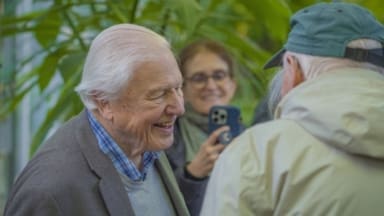
Dr Sonia Haoa Cardinali, a Rapa Nui archaeologist and author of Cultural and Environmental Changes of Rapa Nui gave Sir David Attenborough thirty one seeds of Sophora toromiro, a flowering tree species endemic to Easter Island. He donated the seeds Kew, as he believed they would be safest amongst the living collections tended to at the historic botanical garden.
Sophora toromiro, commonly known as the toromiro tree, is classified as Extinct in the Wild on the International Union for Conservation of Nature (IUCN) Red List of Threatened Species. The plant’s decline has been attributed human activities, such as deforestation and the introduction of agricultural animals to the island in the 18th and 19th centuries, with its extinction in the wild sealed in the 1960s.
The last surviving specimen on Rapa Nui has long vanished, but there is hope as toromiro plants exist in cultivation in botanic gardens across the globe, including toromiro hybrids grown at Kew Gardens. Attempts to reintroduce the plant to Rapa Nui have also seen some degree of success with a number of specimens now thriving on the island, including some in the garden of Dr Haoa Cardinali.
Richard Barley MBE, Director of Gardens at RBG Kew, said: “It has been a great privilege to accept this collection of Sophora toromiro seeds from Sir David Attenborough, a life-long advocate for nature and cherished friend of the Royal Botanic Gardens, Kew. Faced with the dual crises of climate change and biodiversity loss, botanical gardens across the world are on the frontline of the battle to protect our natural world, and as the shepherds of the world’s most biodiverse collection of living plants, RBG Kew will be a perfect new home for the seeds”.
Before the seeds could be donated to Kew they were inspected and given the green light by Joanna Bates, Head of Plant Health and Quarantine at RBG Kew. The movement of plant material is strictly monitored and anything arriving in the UK from abroad must have a valid phytosanitary certificate.
A number of the seeds will be germinated and grown for display in the Temperate House and some deposited in the Millennium Seed Bank at Wakehurst, RBG Kew’s wild botanic garden in Sussex for conservation.

